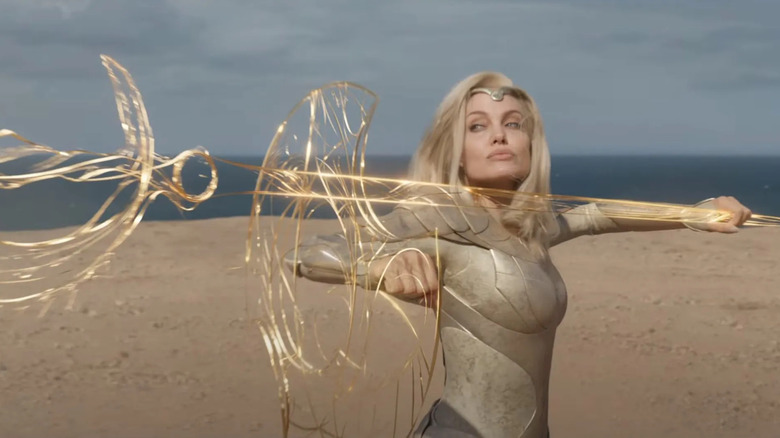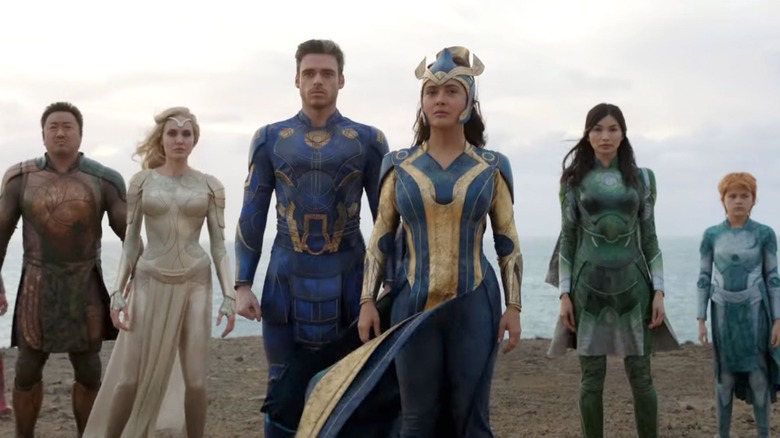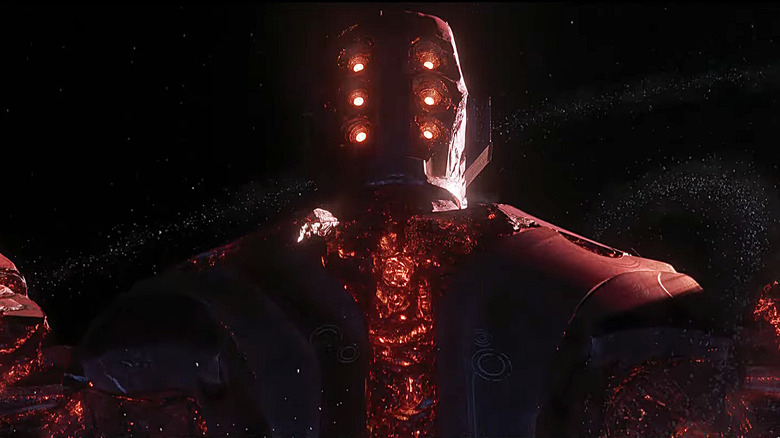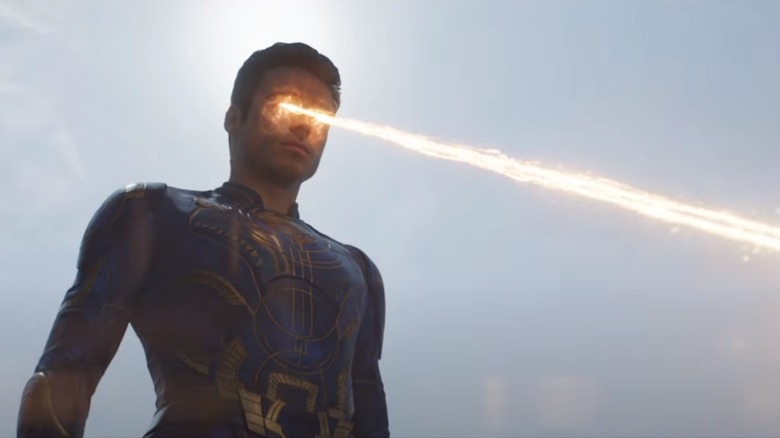Why It Would Be Only Right For The Eternals To Never Return To The MCU
Warning: This post will contain spoilers for the 2021 film "Eternals."
Nate Moore, one of the producers of the upcoming "Black Panther: Wakanda Forever," recently gave an interview with Phase Zero, wherein he address the future of the characters from Chloé Zhao's 2021 "Eternals." In a winking fashion, Moore said that "we have not seen the last of those characters." While he offered no further details about upcoming sequels or TV shows, this brief statement is already being interpreted as a set-in-stone promise. The Eternals will be back on the big screen in the near future.
This may excite fans of "Eternals," but would be unbelievably dismaying for the Eternals themselves. The thought of the Eternals returning is a little antithetical to what the characters were all about.
It's certainly worth noting that the Marvel Cinematic Universe achieves the vast bulk of its cultural staying power not from its individual films, but from its high-profile press releases. Fans of the MCU, when projects are announced, will then commit to a long roster of films and TV shows that will, they know, eventually intersect. Crossover appeal is more important than individual adventures. Even if a fan might be disappointed by a given single chapter in the franchise, they will likely still do a great deal of speculation as to what is coming next, or about how what they just witnessed will play into future installments. As it is currently constructed, the MCU will eternally be moving forward, and it will be rare that anything actually, meaningfully concludes. "Avengers: Endgame" is a curious outlier in this regard.
The uniqueness of the Eternals
When characters are introduced in the MCU, it is a guarantee that they will, eventually, interact with other characters from the MCU. In a sprawling, ever-growing universe of hundreds upon hundreds of characters, this is logical. Eventually, the world will be so lousy with superheroes that they would naturally bump into one another in any one of the now-frequent world-threatening crises that so often beset the planet. "Oh hey! I haven't seen you since the last Doomsday Monster attacked Earth."
Chloé Zhao's 2021 film "Eternals" took quite a different tack from the previous MCU films in many ways. Introducing ten characters at once and shot outdoors with natural lighting, "Eternals" was about a race of impossibly ancient extraterrestrials who have been living on Earth for thousands and thousands of years, aiding the development of humanity by introducing technology at certain points in history — the Eternals invented the plow, for instance — and staying off to the side when humans go to war with one another. Their primary job is to exterminate a dangerous species of quick-evolving monsters called Deviants that come from space, and assure that the human population continues to grow.
The Eternals answer to an unknowable space deity known as Arishem who offers cryptic advice to their leader Ajak (Salma Hayek). Eventually, when Ajak is killed by Deviants, Sersi (Gemma Chan) will take the reins, and learn the horrible truth of the Eternals' nature. They are, in fact, robots built by Arishem, constructed specifically not to evolve, grow, or change. They are not meant to challenge their job.
The god-killing ethic of 'Eternals'
The Eternals have been alive for untold billions of years, and have had their memories erased every time they start a new stint on a new planet. For them, a successful mission means bringing a planet's population to the just right level in order to "activate" a cosmic fetus that has been gestating at the planet's core since its creation. A large number of souls infuse it with the energy it needs to hatch. When the newly born Celestial hatches, it kills the entire population. It does, however, go about creating thousands of additional worlds with its godlike powers. The Eternals are essentially the pollinating bees for a race of outsize, divine beekeepers. Human beings are mere pollen.
Eventually, the Eternals will defy their programming, and cease the Earth from being used as an egg for a new god. In so doing, the characters free themselves of walking the path put forth for them by Providence. The ethic of "Eternals" argues that it will be better to spite the promise of eternal life given by an uncaring God, and better to love humanity as an imperfect, beautiful species. The Eternals become a new race of gods, ones that appreciate the free will and potential, and mortality of humanity.
Indeed, after killing a Celestial, the Eternal Sprite (Lia McHugh), previously trapped in the body of a 12-year-old, will be granted the gift of mortality. She will grow old and die, an exhilarating relief for someone previously locked into a long series of 5,000-year gigs.
The end of the Eternals' story
A large theme of Zhao's film is that of storytelling. Sprite constantly relates to Earth's most ancient civilizations — in a bardic tradition — and the Eternals' epic battles with Deviants. Every one of their fights is an Iliad or an Odyssey unto itself, and it's no coincidence that the Eternals' names sound a lot like gods and deities from ancient Earth stories. Ajak, Thena, and Ikaris are close to Ajax, Athena, and Icarus. For thousands of years, they have been implanting themselves in the collective unconsciousness. They are living Jungian symbols.
The Eternals' presence on Earth, however, was ultimately for nefarious purposes. When they learned that their role in civilization was to eventually destroy it, an irony crept in. All of their efforts to enrich and aid humanity were now tainted. Only in rejecting Arishem and killing the hatching Celestial could the Eternals free themselves. They didn't have to be "important." They were now permitted to retire as demigods. Anonymity was the glorious end to a long life of being auspicious.
So when a film producer announces that the Eternals will return in a superhero capacity, it stings. The Eternals have already earned the right to no longer be an important part of humanity. They can now be anonymous. They can now love. They no longer have to concern themselves with aiding humanity through its evolution.
Humanity is grown now. We can go our own way without the constant look of parents or gods. Are the Eternals going to put their costumes back on? Go to war? Fight supervillains? Make friends with Thor? It's all so churlish in comparison to what they've been through. It would better serve the characters to let them be. Their story is over. Let it be over.



